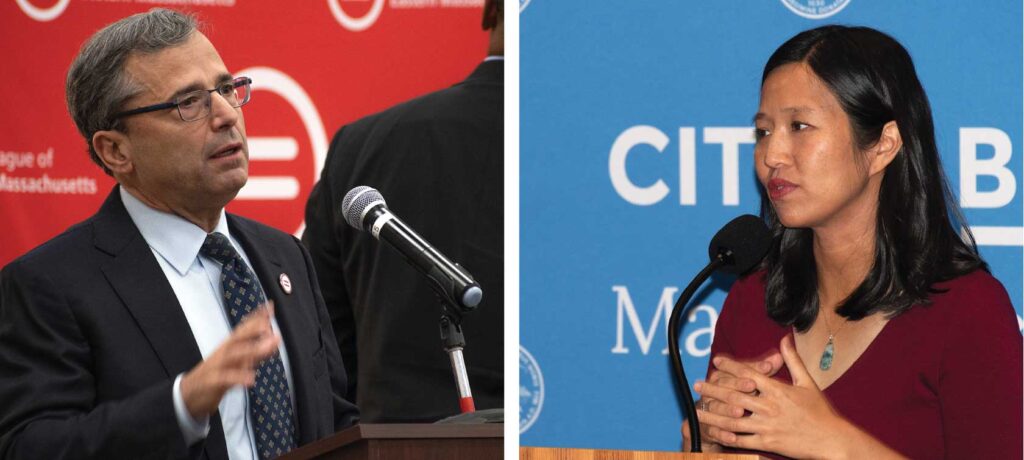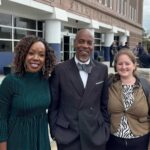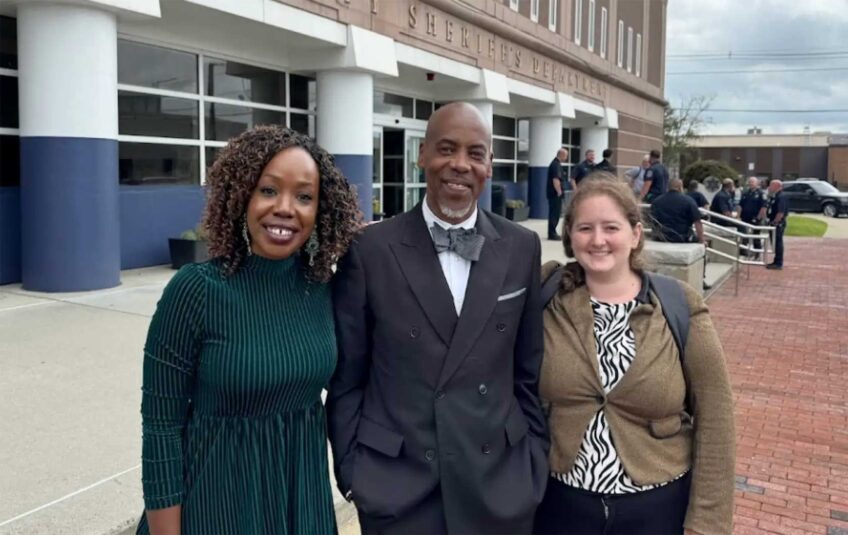
During Boston’s last mayoral election four years ago, Michelle Wu was hailed as a climate leader, but she wasn’t the only candidate staking a position on how the city should better serve its residents while building environmental justice initiatives aimed at addressing disparities in access and impact.
All five of the main candidates who ran in the preliminary election had an explanation of their policy positions around climate and environmental justice.
This year? Not so much.
On her campaign website in this year’s race, Wu devotes a paragraph to some of the city´s climate work during her first term but has no webpage dedicated to explaining her position as a candidate.
Domingos DaRosa, a community activist and Dorchester resident running to unseat Wu, mentions “green space and environmental justice” in a list of key priorities.
But otherwise, in official campaign webpages, the topic is generally unmentioned.
For Hessann Farooqi, executive director at the Boston Climate Action Network, that limited conversation leaves gaps that need to be filled for voters looking to inform themselves about the various positions of the candidates.
“I don’t think it’s been covered enough in this campaign so far, except for on the narrow issue of bike lanes, which have been a big source of discussion — which certainly have a climate component to them — but overall, we haven’t seen a tremendous amount of coverage of this,” Farooqi said.
Though Farooqi said he’d like to hear more from candidates about their views and policies on climate and the environment, voters at large may not share that priority. In a July poll from Suffolk University and the Boston Globe, of the 500 respondents, 10 listed climate change and the environment as their top priority in this year’s race.
But, in that arena, Wu may still hold sway. Of those 10 respondents, the bulk of them said they were leaning toward Wu, of the four candidates, as their first choice in the 2025 election.
The Banner reached out to all four mayoral candidates to get a better sense of their climate plans and priorities. The campaign of Bob Cappucci did not respond to a request for comment.
Wu: Building off an existing record
While the topic hasn’t been widely broadcast in this year’s election, Farooqi pointed to the personal histories working in the space from the candidates, especially the two leading ones: Wu and Kraft.
In the Suffolk University and Boston Globe poll, almost 90% of respondents listed Wu or her opponent Josh Kraft as their top choice; about 60% of respondents overall cited Wu as their top choice, with a 30-percentage-point lead over Kraft.
For Farooqi, Wu’s growing track record in the climate space is an important consideration.
In her first term is as mayor, Wu took steps to restructure the city government to better address climate issues: creating an Office of Green Infrastructure and an Office of Climate Resilience, as well as retooling the head of the city’s Environment, Energy and Open Space Cabinet to a “chief climate officer” position, tasked with also setting up a climate cabinet to help steer city government.
The administration has also divested the city from fossil fuels, launched a regional agreement that will train 1,200 Boston residents and place them in green jobs, and expanded the fare-free bus pilot program to include the MBTA’s 23 and 29 routes. The fare-free pilot on the Route 28 bus began in August 2021, before Wu took office.
That list of achievements is one that the Wu campaign has hung its hat on. In July, Wu’s campaign held a press conference highlighting the climate initiatives she has pursued over the past four years; the event also featured an endorsement of her bid for reelection by Sen. Ed Markey, a longtime climate advocate in Congress.
And in response to a Banner request for comment, a spokesperson for the Wu campaign shared a bullet list with nine climate achievements and a list of climate-focused campaign promises from the 2021 election that Wu has taken steps on.
For Farooqi, Wu’s track record is hefty, and one that leaves the field “unbalanced.”
“It’s a bit of an unfair comparison, because one of these people is actually doing a whole lot of things on climate, the other one has done nothing on climate and hasn’t really said much on it either,” Farooqi said.
Kraft: ‘Touching nearly every aspect of policymaking’
While Kraft’s campaign site has no specific material focused on climate and the environment, in a statement to the Banner, the campaign said Kraft “views the fight against climate change and resulting threats to our environment as something that touches nearly every aspect of policymaking.”
A spokesperson also shared a list of policy ideas that the campaign said Kraft is exploring.
That list included siting more electric vehicle charging infrastructure in parking lots through partnerships with commercial businesses, which the campaign said would do better to increase accessibility and availability of charging.
And the campaign said Kraft is exploring steps the city can take to improve coastal resilience, including close coordination with regional partners and academic institutions to “ensure that we are using every lever we can to protect and safeguard our coastal communities.”
The Kraft campaign did not reply to a request for clarification regarding how Kraft’s plan would differ from steps taken by the Wu administration since she assumed office in 2021, or plans assembled by previous mayoral administrations, like the Climate Ready Boston initiative, launched in 2016, which drafted coastal resilience plans for the city’s 47-mile coastline.
And Kraft’s campaign said there is a need for increased and more equitable access to green space across the city, alleging that public parks in a number of the city’s Black and brown communities have not been maintained at the same level as other green spaces across the city.
As an example, he pointed to the city’s plans to renovate White Stadium, which include the removal of 145 mature trees.
“The recent removal of hundreds of trees in Franklin Park near White Stadium is a perfect example of this. Climate resilience must be woven into nearly every aspect of policy decisions, particularly at the local level where small changes can have a big impact,” the campaign said in a statement.
DaRosa: Focus on equity and education
The ongoing battle over White Stadium and the loss of over 100 mature trees was a point with which DaRosa, one of the other candidates, also raised concerns.
“Those trees cannot be replaced in my generation or my kids’ generation,” DaRosa said. “Those trees, some of them go back a couple of 100 years, and that’s a real thing.”
The Wu campaign pointed to city plans that would plant more than 500 trees in the space over the next decade. And the city has said that most of the removed trees are invasive species that were slated to be removed anyway following the guidance of a 2022 Franklin Park Action Plan.
That equity focus is an element that DaRosa said would guide his environmental policy, if elected. If elected, he said that he would lead a citywide audit on Boston’s climate and environmental policies to understand where things stand in the city now and how resources can better be used.
“With anything I do, I’ll always start off with an audit to make sure that we have an idea of what is and what isn’t, to make sure that we’re addressing it, equitably and efficiently with the funding that we do have,” DaRosa said.
That effort would be paired with education through municipal efforts to make sure residents understand what programs exist and how to access them.
And his educational push would extend to efforts in Boston Public Schools as well. DaRosa said he’d like to see forestry and arborist training included at Madison Park Technical Vocational High School.
“That’s something that I would bring in to make sure that we educate our next generation on what it is and why it is important to continue to support Mother Nature,” he said.
The city currently runs its PowerCorpsBOS program, a workforce development program for young people aged 18 through 22 years old that trains in skills around urban forestry, green building operations and urban greening.
DaRosa said that the program, which began in 2022 under the Wu administration, is similar to his vision, but he’d like to see that sort of education available for even younger residents, like those in high school.
Climate leadership in the age of Trump
Despite relatively limited public communication about climate priorities, now may be an increasingly important time for city leadership when it comes to green issues. Since November, as advocates stared down anticipated decreases in federal funding and support for climate efforts under a reelected President Donald Trump, municipal and state efforts are all the more important, they said.
Funding, perhaps, will be one of the large concerns with reduced federal support. Over the past four years, the city has relied on federal grants to support efforts like transitioning part of Boston Public School’s bus fleet from diesel to electric school buses, or to take steps to try to close gaps in the city’s tree canopy.
Its fare-free bus route pilots were funded through COVID-19-era American Rescue Plan Act funds.
“We can’t count on the same kinds of federal investments that we’ve seen in the last federal administration anymore,” Farooqi said. “It is all the more reason that cities and states need to step up their commitments in funding the kinds of climate infrastructure that we really need to see.”
DaRosa said he views reduced federal support as a moment to better balance the books on climate efforts.
“It seems like the more we give, the less is being done,” he said. “We have to do an audit on how we go about using the funding that we do have; we can’t just be spending money because we have it.”
To close potential gaps in funding, DaRosa suggested an additional fee or tax on tourists coming into downtown Boston.
“Folks come in and use city services within that downtown area, and we’re not getting anything compensated to help offset the cost of putting on these, you know, these events,” he said.
The Wu campaign said that it was grateful for the federal funds that have been used to advance various city projects and lay the foundations for their operations. While the Trump administration is forcing tough choices, the campaign said, a second Wu administration would remain committed to preparing Boston to deal with the threats raised by climate change and seek new partners to fund the existing programs.
The Kraft campaign did not respond to requests for comment regarding its position on addressing or funding climate issues in response to federal shifts.
As the race progresses, Farooqi said it will be important for whichever candidate ultimately wins in September’s preliminary election and November’s general election to determine how to address widening gaps in federal climate policy, such as Trump’s so-called “One Big Beautiful Bill,” which made significant cuts to the Inflation Reduction Act and its environmental measures, as well as steps from the EPA to shut down its research arm and overturn a 2009 finding that has allowed it to take action to rein in climate change.
“We have to keep doing as much as we possibly can and then some to make up the gap to the best of our ability that the federal government is creating,” Farooqi said.






